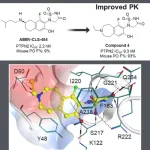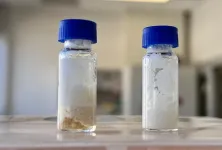(Press-News.org) In recent years, cancer immunotherapy, exemplified by PD-1 and its ligand PD-L1 blockade, has made remarkable advances. But while immunotherapy drugs offer new treatment possibilities, only about 20% to 40% of patients respond to these treatments. The majority either don't respond or develop drug resistance. Researchers are now looking for ways to enhance the scope of tumor immunotherapy in order to benefit a wider range of patients.
One such avenue is through the protein tyrosine phosphatase non-receptor type 2 (PTPN2) and its close superfamily member, PTPN1, identified in previous research as crucial modulators involved in the regulation of immune cells signaling pathways that promote tumorigenesis by attenuating tumor-directed immunity. While promising, the development of PTPN2/PTPN1 inhibitors has faced challenges as a result of unfavorable pharmacokinetics due to the highly cationic active site and the relatively shallow nature of the protein surface.
In a significant milestone, researchers at Abbvie discovered the dual PTPN2/N1 inhibitor ABBV-CLS-484 through structure-based drug design and optimization of drug-like properties. Now, clinical stage artificial intelligence (AI)-driven drug discovery company Insilico Medicine (“Insilico”) has initiated a program with a fast-follow strategy to design a novel PTPN2/N1 inhibitor with drug-likeness properties and in vivo oral absorption, supported by the Company's generative AI drug design engine Chemistry42. The research was published in the European Journal of Medicinal Chemistry on April 5.
Scientists inputted the structure of the known PTPN2/N1 inhibitor as a reference compound to Chemistry42 as a starting point and generated a series of novel PTPN2/N1 inhibitors based on ligand-based drug design strategy. They further optimized and synthesized the most promising molecules and obtained candidates with desirable ADME properties. Insilico's compound demonstrated enhanced oral absorption, systemic exposure, and equivalent biological activities compared to the reference compound in in vitro studies. Furthermore, Insilico’s compound demonstrated the same efficacious dose as the reference compound in murine model.
“One of the most significant advances in the research was validating the fast follow ability of Chemistry42, the molecular generation and design engine of Pharma.AI, which allows users to rapidly improve existing molecules with more desirable properties,” said Xiao Ding, PhD, vice president and head of medicinal chemistry of Insilico Medicine. “In this paper, we reported a novel PTPN2/PTPN1 inhibitor demonstrating nanomolar inhibitory potency, good in vivo oral bioavailability, and robust in vivo antitumor efficacy. Further investigation is currently ongoing.”
Insilico Medicine is a pioneer in using generative AI for drug discovery and development. The Company first described the concept of using generative AI for the design of novel molecules in a peer-reviewed journal in 2016. Then, Insilico developed and validated multiple approaches and features for its generative adversarial network (GAN)-based AI platform and integrated those algorithms into the commercially available Pharma.AI platform, which includes generative biology, chemistry, and medicine and has been used to produce a robust pipeline of promising therapeutic assets in multiple disease areas, including fibrosis, cancer, immunology and aging-related disease, a number of which have been licensed. Since 2021, Insilico has nominated 18 preclinical candidates in its comprehensive portfolio of over 30 assets and has advanced six pipelines to the clinical stage. In March 2024, the Company published a paper in Nature Biotechnology that discloses the raw experimental data and the preclinical and clinical evaluation of its lead drug – a potentially first-in-class TNIK inhibitor for the treatment of idiopathic pulmonary fibrosis discovered and designed using generative AI currently in Phase II trials with patients.
About Insilico Medicine
Insilico Medicine, a global clinical-stage biotechnology company powered by generative AI, connects biology, chemistry, and clinical trial analysis using next-generation AI systems. The company has developed AI platforms that utilize deep generative models, reinforcement learning, transformers, and other modern machine learning techniques for novel target discovery and generating novel molecular structures with desired properties. Insilico Medicine is developing breakthrough solutions to discover and develop innovative drugs for cancer, fibrosis, immunity, central nervous system diseases, infectious diseases, autoimmune diseases, and aging-related diseases. www.insilico.com
END
Insilico Medicine develops novel PTPN2/N1 inhibitor for cancer immunotherapy using generative AI
2024-04-11
ELSE PRESS RELEASES FROM THIS DATE:
$318 million New York City community parks initiative is associated with increased use of urban parks in low-income neighborhoods
2024-04-11
A new study in JAMA Network Open led by researchers from the CUNY Graduate School of Public Health and Health Policy observed 28,322 park users across 54 neighborhood parks and found a clear association between park renovation and park use in low-income neighborhoods in New York City (NYC).
As the global trend toward urbanization continues, two thirds of the world’s population is predicted to live in cities by 2050. Amid the noise, stress, and crowding of city life, urban parks have the potential to provide opportunities for physical activity, mitigate heat and pollution, lower stress, and improve mental and social well-being, all of which can decrease the prevalence ...
Trapped in the middle: billiards with memory
2024-04-11
Adding one simple rule to an idealized game of billiards leads to a wealth of intriguing mathematical questions, as well as applications in the physics of living organisms. This week, researchers from the University of Amsterdam, including two master students as first authors – have published a paper in Physical Review Letters about the fascinating dynamics of billiards with memory.
Billiards: a mathematical mystery
An idealized version of the game of billiards has fascinated mathematicians for decades. The basic ...
A new spin on organic shampoo makes it sudsier, longer lasting
2024-04-11
While there’s no regulation in the U.S. for what’s in organic shampoos, they tend to contain ingredients perceived as safe or environmentally friendly. However, these “clean” shampoos separate and spoil faster than those made with synthetic stabilizers and preservatives. Now, researchers in ACS Sustainable Chemistry & Engineering demonstrate that a simple process — spinning organic shampoo at high speeds — improved the final products’ shelf lives and ability to clean hair.
Natural emulsifiers, such as xanthan gum and cetyl alcohol, ...
Nanoscale movies shed light on one barrier to a clean energy future
2024-04-11
DURHAM, N.C. -- Left unchecked, corrosion can rust out cars and pipes, take down buildings and bridges, and eat away at our monuments.
Corrosion can also damage devices that could be key to a clean energy future. And now, Duke University researchers have captured extreme close-ups of that process in action.
“By studying how and why renewable energy devices break down over time, we might be able to extend their lifetime,” said chemistry professor and senior author Ivan Moreno-Hernandez.
In his lab at Duke sits a miniature version of one such device. Called an electrolyzer, ...
American College of Lifestyle Medicine announces first two medical schools to earn highest recognition and certification for lifestyle medicine curriculum
2024-04-11
The American College of Lifestyle Medicine (ACLM) has announced that the University of South Carolina School of Medicine Greenville (SOMG) and Loma Linda University School of Medicine (LLUSM) are the first to earn the highest recognition of a “Platinum Plus” certification designation for the significant level of undergraduate lifestyle medicine curricula within their programs.
The Platinum Plus is the highest tier of certification that a medical school can receive from ACLM and indicates the incorporation of at least 100 hours of evidence-based lifestyle medicine content within the curriculum. This level of lifestyle medicine ...
Avi Wigderson receives ACM A.M. Turing Award for groundbreaking insights on randomness
2024-04-11
ACM, the Association for Computing Machinery, today named Avi Wigderson as recipient of the 2023 ACM A.M. Turing Award for foundational contributions to the theory of computation, including reshaping our understanding of the role of randomness in computation, and for his decades of intellectual leadership in theoretical computer science.
Wigderson is the Herbert H. Maass Professor in the School of Mathematics at the Institute for Advanced Study in Princeton, New Jersey. He has been a leading figure in areas including computational complexity theory, algorithms and optimization, randomness and cryptography, parallel and distributed computation, combinatorics, and graph theory, as well as ...
NAWI awarded funding to continue to accelerate research and development for a secure water future
2024-04-11
– By Lauren Core
The National Alliance for Water Innovation (NAWI), which is led by the Department of Energy’s (DOE) Lawrence Berkeley National Laboratory (Berkeley Lab), has been extended for five more years with $75 million in funding from DOE. NAWI will continue its contributions to helping decarbonize the water and wastewater sectors through investments in technologies that enhance the efficient use of energy for water use, treatment, and distribution.
“Water and energy are interdependent – water is used to produce nearly every major energy source, and ...
2024 Research Fellowship Awards to support three exciting disease intervention research projects
2024-04-11
Systems Biology Ireland (SBI) at University College Dublin (UCD) and The Quantitative Biosciences Institute (QBI) at the University of California, San Francisco (UCSF), and) have announced the 2024 winners of the joint Research Fellowship Awards (RFAs).
The Research Fellowship Awards aim to support collaborative high quality and ground -breaking research proposals from QBI-UCSF and UCD in the areas of network biology and drug/drug target discovery.
The winning projects for 2024 are:
“Overcoming Resistance to HER2-Targeted Therapies in Breast Cancer,” ...
Laura Soucek receives an ERC Advanced Grant to maximize the clinical and preclinical use of the first viable MYC inhibitor
2024-04-11
Laura Soucek, an ICREA Research Professor, Director of VHIO’s Experimental Therapeutics Program, and Head of our Models of Cancer Therapies Group, has received a European Research Council (ERC) Advanced Grant to maximize the use of the first clinically viable MYC inhibitor.
This ERC funding program is amongst the EU’s most prestigious and competitive, providing leading senior researchers with the opportunity to pursue ambitious, curiosity-driven projects that could lead to major scientific breakthroughs. The new grants, worth in total nearly €652 million, are part of the EU’s Horizon Europe programme. ...
UMSOM researchers identify safety of a potential new treatment to manage complications from sickle cell disease
2024-04-11
A drug approved to treat pulmonary arterial hypertension may be effective at managing hypertension and end-organ damage in patients with sickle cell disease, according to a new study published in Lancet Haematology. An early phase randomized clinical trial involving 130 patients with sickle cell disease found that the drug, called riociguat, was found to be safe to use and well tolerated in these patients and significantly improved their blood pressure. Preliminary efficacy data suggested the medication might improve heart function.
An estimated 100,000 Americans ...






